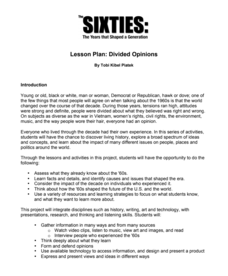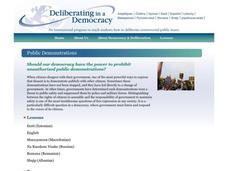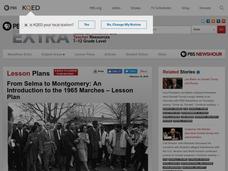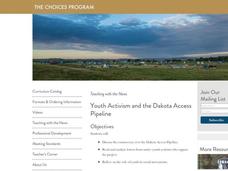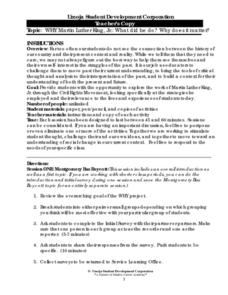PBS
Latino Americans: Timeline of Important Dates
From 1500-2000, an interactive timeline details important events related to Latino Americans. Next, to each date are small, yet informative blurbs—some of which include videos.
ProCon
National Anthem Protests
San Francisco 49ers quarterback Colin Kaepernick refused to stand for the National Anthem in 2016 as a form of protest. Were his actions appropriate? Using the provided website, pupils attempt to decide for themselves by reading the main...
National Endowment for the Humanities
Revolution '67, Lesson 2: What Happened in July 1967? How Do We Know?
Even in a world in which dozens of participants and curious onlookers record every controversial event, the basic facts of what happened are often in dispute. Revolution '67, Lesson 2 explores 1967 Newark, New Jersey using an examination...
National Endowment for the Humanities
Revolution '67, Lesson 1: Protest: Why and How
To some people, protesting is as American as apple pie, but the factors that lead to protests can be as confusing to veteran activists as to today's youth. Revolution '67 explores the riots in Newark, New Jersey as a case study. Using...
PBS
Lesson Plan: Divided Opinions
To gain a more in-depth understanding of the tumultuous 1960s, young historians examine video clips, listen to music, examine images, and interview survivors. Once they have a foundation of information about the period, class members...
PBS
The Black Panthers
Stanley Nelson's acclaimed film, The Black Panthers: Vanguard of the Revolution uses interviews, archival footage, and images to document the story of the radical political party established in 1966 by Huey Newton and Bobby Seale. A...
Deliberating in a Democracy
Public Demonstrations
Have you ever fought publicly for an idea you believe in? Scholars research and analyze the right to demonstrate peacefully. Incorporating different real-life scenarios as well as legal decisions exposes the concept of democracy and free...
Stanford University
Lesson Plan: The Children's Crusade and the Role of Youth in the African American Freedom Struggle
Young people played significant roles in the Civil Rights movement. Class members examine the contributions of Barbara Johns, Claudette Colvin, Mary Louise Smith, and the children of Birmingham,...
PBS
The Sixties: Dylan Plugs in and Sells Out
Before Woodstock, there was Newport. Get plugged in to the social changes of the 1960s with a lesson that looks at Bob Dylan's performance at the 1965 Newport Folk Festival as a symbol of the radical changes that marked the era.
PBS
Breaking the Code: Actions and Songs of Protest
Ezell Blair, Jr., David Richmond, Franklin McCain and Joseph McNeil changed history. Their sit-in at the lunch counter of the Woolworths in Greensboro, North Carolina on February 1, 1960 became a model for the nonviolent protests that...
PBS
From Selma to Montgomery: An Introduction to the 1965 Marches
The 1965 Civil Rights marches from Selma to Montgomery and the resulting Voting Rights Act of 1965 are the focus of a social studies lesson. The resource uses film clips to inform viewers not only about the discrimination that gave rise...
Brown University
Youth Activism and the Dakota Access Pipeline
Do young people have a role in social movements? Should they? The involvement of young people in the Dakota Access Pipeline is the focus of a resource that asks class members to examine letters written by native youths who oppose the...
City University of New York
Women's Suffrage and World War I
Democracy cannot exist where not everyone has equal rights. Discuss the state of democracy and women's suffrage during World War I with class discussions, debates, and primary source analysis, in order for class members to connect with...
Curated OER
Concept Formation Lesson Plan: Understanding "Protest"
After analyzing both examples and non-examples of a variety of protests conducted by ethnic groups in Seattle and the state of Washington during the twentieth century, your class members will work to identify the key ideas and components...
Umoja Student Development Corporation
Martin Luther King, Jr.: What Did He Do? Why Does It Matter?
Young historians examine the work of Martin Luther King Jr. by reading and answering questions about the Montgomery Bus Boycott, the Albany Movement, the Birmingham and Chicago campaigns, and the Memphis Sanitation Worker's Strike.
Student Handouts
Major Strikes in the American Labor Movement
Have your class organize information about strikes in a handy chart. Pupils take notes on the Homestead Strike, the Lawrence Strike, and the Pullman Strike. Along the left side of the chart are six questions for learners to answer about...
Facing History and Ourselves
Choosing to Participate Posters
"A poster exhibit to encourage dialogue, engagement, respect, and participation in our communities..." This is a set of attractive posters that reference influential historical figures, such as George Washington and Albert Einstein, and...
Curated OER
America Established Because of Protest
Students explore events and causes that led to American Revolution and examine popular pro-Patriot renderings and texts of these issues created both at that time and in later years. Students then prepare and deliver oral presentations...
Curated OER
Cartoons and Protest
Students examine political cartoons from 1774 through today, determine their meanings through analysis and discussion, and create their own political cartoons focusing on historical issues studied in class.
Curated OER
The Art of Protesting
Students view various images to examine different types of protest Americans have used throughout history, and explore ways in which protest can produce change for better or worse.
iCivics
DBQuest: The Nashville Sit-In Movement
What was it like to be a part of the sit-ins during the Civil Rights Movement? Learners consider the question and whether the protests were effective using an online documents-based investigation. The program allows for virtual...
Curated OER
Speaking Out Against War
Students research on the Web and in other venues to track the Iraq war protests high school students have joined or even led. Students interview students in your community who have joined protests or expressed their views in other ways...
Curated OER
Songs of Mass and Individual Protest: USA, Jamaica, and South Africa
Learners study songs of mass and individual protest. They view a video clip and discuss the song and words the protesters sing. They study the song, "We Shall Overcome" and discuss the characteristics of the song and chant and sing it....
Curated OER
Protest Music Video
Students create an iMovie that expresses the meaning of a protest song from the 1960's or 1970's. They investigate the emotional and political overtones of the times and use images to interpret the song's meaning.






